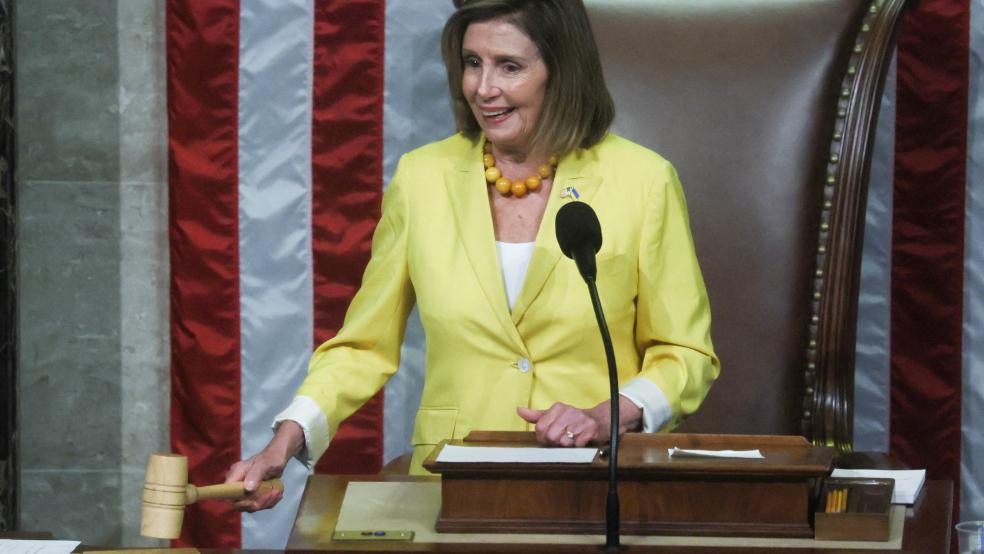After more than a year of intraparty clashes and rollercoaster negotiations, the final vote on Democrats’ big climate, health care and tax package came and went without much drama.
The House on Friday evening approved the $740 billion package, sending the legislation to President Joe Biden, who will soon be able to celebrate another landmark White House signing ceremony.
What’s in the bill: Just as a reminder, the legislation includes some $370 billion for climate and energy programs aimed at dramatically reducing greenhouse gas emissions. It also aims to lower prescription drug costs by allowing Medicare to directly negotiate the price of some medications and caps annual-out-of-pocket drug costs for Medicare beneficiaries at $2,000. The package also extends expanded Affordable Care Act subsidies for three years.
The new spending is more than offset by health care savings and tax increases, including a 15% corporate minimum tax and a 1% tax on corporate stock buybacks. In all, the legislation is projected to reduce deficits by $300 billion over the next decade — and potentially by far more in the years after that
‘A day of celebration’: The package went through multiple versions and appeared to die multiple deaths, including just last month, when Sen. Joe Manchin (D-WV) again told Democrats he could not support their climate spending and tax changes given that inflation was at a four-decade high. But Manchin and Senate Majority Leader Chuck Schumer (D-NY) continued their talks and before long they delivered a surprise deal. The Senate passed the Inflation Reduction Act on Sunday in a 51-50 vote, with Vice President Kamala Harris casting the tie-breaking vote.
All that was left, then, was for the House to take up the Senate-passed bill. The House vote was 220-207, with all Democrats backing the bill and Republicans uniformly opposed.
“Today,” House Speaker Nancy Pelosi (D-CA) said before the final vote, “is a day of celebration. A day we take another giant step in our momentous agenda. Our Inflation Reduction Act is a robust cost-cutting package that meets the moment, ensuring that our families thrive and that our planet survives.”
Pelosi touted the health-care provisions in the package, which will allow Medicare to negotiate some drug prices for the first time. “Make no mistake: These measures are a big blow to pharma, which has had a stranglehold for decades preventing us from making this move,” Pelosi said. “Now we have relaxed that stranglehold a bit — more to be done — but we’re giving more leverage and more breathing room to America’s families.”
The pharmaceutical industry opposed the legislation and warned that it would reduce innovation and drug development. “After many months of legislative wrangling, we are left with a partisan, government price setting bill that will lead to fewer cures and treatments and doesn’t do nearly enough to make medicines more affordable for most Americans,” Stephen J. Ubl, president and CEO of the Pharmaceutical Research and Manufacturers of America, said in a statement.
Democrats had hoped for more: The House last year passed a much larger version of the legislation, a $2.2 trillion “Build Back Better” package that included more climate spending as well as social programs that were dropped from the bill on the Senate side.
Some Democrats expressed disappointment that the scope of the bill had been narrowed so dramatically, from an initial $3.5 trillion, with some of the party’s grand plans for health and social reforms falling by the wayside.
“There’s a lot of heartache in legislation,” Rep. Peter Welch (D-VT) told Politico on Thursday. “You start out with the aspiration for perfection and hopefully you get to settle for progress. Look, we had to make concessions to get 218 votes in the House and 51 in the Senate. So I’m disappointed at what got left behind but still thrilled that we can finally get relief to people struggling with high drug prices.”
Budget watchers celebrate, too: The package is the first major deficit-reduction bill in years, and fiscal hawks who had expressed concern about Democrats’ initial spending plans cheered the evolution of the legislation. “With today’s passage of the Inflation Reduction Act, lawmakers made an important pivot from reckless to responsible budgeting,” said Maya MacGuineas, president of the Committee for a Responsible Federal Budget. “This bill started out as a plan filled with gimmicks that would add massively to the national debt and ended as one to reduce the deficit, help the Federal Reserve push against inflation, and serve as a model for how legislation can improve with real effort and leadership.”
The bottom line: Biden and Democrats have secured a big win that seemed out of reach many times over the past year. Whether that win translates into election success remains to be seen, given that voters won’t see the benefits of the bill for quite some time. "The challenge for the Democrats will be can they make what they did with the IRA seem current in today's very short-term environment,” Robert Blendon, a professor of health policy and political analysis at Harvard University, told Axios.





